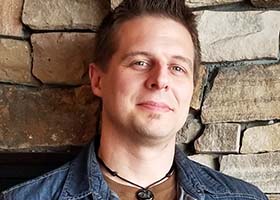
by Nathan Buck
A disoriented person is incredibly vulnerable. We know this. And when we feel disoriented we do everything to convince ourselves we are in control, we know where we are, and some familiar landmark must just be up ahead.
Just imagine having amnesia and not being able to remember the things that help you be aware of your identity, your location, your home, or your reason for living. You would be dependent on feelings, and the input from people around you to try and figure out who you are and what to do. But you have no memory of experiences to help you know if those feelings or the people are trustworthy. You would be in need of something to orient you in regard to space, time, culture, purpose, morality, etc.
When teenagers and young adults are discovering and exploring their own thoughts and actions, there is confusion and disorientation, because they have not had the life experience to help them filter their thoughts and actions in healthy ways. If their natural process of discovery is interrupted by unhealthy ideologies or advice, it is incredibly difficult for them to discern. When they receive advice that says, "Try everything," they may not have any experiences to help them see the dangers of that philosophy.
The same is true for adults. When people forget what is good, right, or true, then there is confusion and disorientation around what is moral and what is not. We may be able to gain enough information to create a relative "normal" based on what we hear or learn, but it is insufficient. No human experience is capable of seeing from a large enough perspective to discern fully what is best in every situation.
Take a moment and read all of
Proverbs 2. Notice the father giving advice to the son. Is he telling his son to look even beyond his dad's knowledge? In fact, he says that the son should discover and know God so that, "...you will understand what is right and just and fair—every good path. For wisdom will enter your heart, and knowledge will be pleasant to your soul. Discretion will protect you, and understanding will guard you. Wisdom will save you from the ways of wicked men, from men whose words are perverse, who have left the straight paths to walk in dark ways, who delight in doing wrong and rejoice in the perverseness of evil, whose paths are crooked and who are devious in their ways." (
Proverbs 2:9-15)
In order to know what is best, we need to seek greater than human wisdom and knowledge, because our knowledge is transient. What we know, and what we choose to remember, slants our perspective and shades our ability to see clearly what is good. A strong emotional story can cause us to drift from a moral absolute into making exceptions, and then eventually considering what is immoral to be good. Our ability to set our own norms is limited. The limited human definitions of "normal" have an inherent danger of being short-sighted and biased toward comfort and immorality.
When we look to God's Word for His insight and His wisdom, we are able to see what is truly moral and immoral. Why? Because He sees it both from our perspective and from His eternal perspective. God has the insight and the timelessness to connect all the actions and reactions and see what is truly good, what is truly sinful, and what is truly evil. God's "normal" isn't dangerous to us, but is it dangerous to our selfishness and to our immoral desires.
So, you may be a teenager exploring the universe of your experiences to try and find some direction and orientation to your existence. You may be an adult adrift in the voices of our culture telling you all kinds of stories and studies and pseudo-science. Please recognize you are constantly having people and companies trying to sell you their version of "normal." You may even have religious people, or socially-minded religious people, giving you their version of God's norms.
But God's ways are unchanging, His perspective doesn't shift, and what He says is good and right and true, always is. How we live that out in each culture may look slightly different, but the core moral principle will not change and will not call something sinful or evil, good.
Whatever is good, or right, or true, or excellent, or praiseworthy, we are to think on these things, and God promises to be with us as we keep our thought oriented on Him (
Philippians 4:8-9). We know what is good by learning God's Word. We live what is good by adjusting our lives to His norms. We keep what is good by sharing His love and truth with others.
Will you check your norms and make sure they are oriented toward God's? How are you helping disoriented people?
This forum is meant to foster discussion and allow for differing viewpoints to be explored with equal and respectful consideration. All comments are moderated and any foul language or threatening/abusive comments will not be approved. Users who engage in threatening or abusive comments which are physically harmful in nature will be reported to the authorities.


0 comments:
Post a Comment